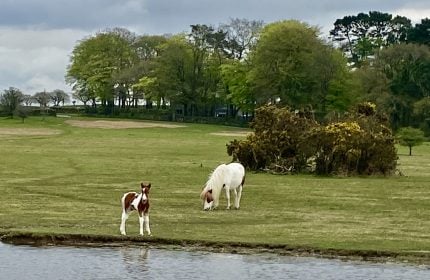Family History
The flames on Mrs Elstob’s chest always got the blame for what happened. At least as far as me Dad was concerned. “Her and her bloomin’ chest. It was all her fault,” he used to say. ‘‘And I don’t why she calls it ‘flames’. It’s phlegm, that’s what it is. Not blasted ‘flames?’” Mam never answered him on this question.
Dad never had a good word to say for Mrs Elstob or for her Norman who hadn’t worked since 1928. Whenever Norman complained his leg was giving him gyp, Dad used to say to Mam, “Well, it never lets’m down at openin’ time. The bugger’s at the pub every night at six, leg or no leg.”
But Mam always saw the good side of people.
“Never slept a wink all night, love,” Mrs Elstob used to say. “It’s the ‘flames’ on me chest.”
And Mam would say, “Oh dear, can I get you somethin’?”
“I can scarcely breathe, hinny. It’s really something awful. There’s no betterness for the ‘flames’,” Mrs Elstob would say. “Unless you’ve gorra bowl of soup or summick like that.” And then she’d go home and put her head under a towel and snoke up the fumes of Friar’s Balsam.
I had no idea how much the Elstobs scrounged off Mam in those days. I don’t know how she could afford to give anything away. What I do know is that she never let on to Dad.
But for me there were more important things in life.
Especially that Wednesday morning in the last week of August when, hard up as they were, Mam and Dad gave me a bike for me birthday. They’d saved up for it. It wasn’t new but it was beautiful. I rode it every possible minute.
On the Friday morning I was still wobbling about. Then, as if by magic, I mastered it.
On the Saturday I was riding with no hands. Course, our Maureen was out in the back lane, spying.
“I’ll tell if you don’t use both hands,” she kept saying but I ignored her.
At about half-past ten on the Sunday morning, she was there again.
“You’ll have an accident on that bicycle,” she said in her best Convent School voice. “Anyway, be back here in twenty minutes.”
“Why?”
“Dad says. He wants you back. Anyway, it should be obvious why.”
It wasn’t obvious to me.
About ten to eleven when I was leaning me bike on the back lane wall, the Elstobs came out of their back door.
“The batteries’ve gone on the wireless,” Norman said. “We’re goin’ over to listen to yours.”
Then he saw the bike. He hadn’t seen it before but now he was giving it the once-over, inspecting every part like an expert.
“By, son,” he said, “wonderful, eh?”
Then Mrs Elstob inspected it.
“Goodness,” she said. “Looka that. Lovely, isn’it, Norman?”
Just then, Mam came out into the lane.
“Just lookin’ at the bike here,” Norman said to Mam before turning to me. “By, you’re norrarf lucky, you are.”
Then Mrs Elstob cut in.
“Can he pop a message errand for us?”
Mam hesitated.
“Only take’m a minute on the bike,” Norman said. “Just up to Hardin’s.”
“Yes, Mam,” I said. “It’ll not take a minute.”
“Worra good bairn you are,” Mrs Elstob said, pushing a coin into me hand. “Just a bottle of Friar’s Boslum, love.”
“And five Woods. And a bottle of IPA.” Norman was rubbing his hip. Obviously it was giving him gyp.
Mam was a bit anxious but trying not to show it. “Hurry up, then,” she said.
Up at the corner shop I was the only customer. But old Harding only went one speed. He rummaged round in a tangle of skipping ropes, bundles of firewood, kippers and bottles of Tizer.
“Friars what?
“Boslum.” He sniffed.
“Who’s it for?”
I told him.
“Hm.”
At last he found it.
“And five Woods and an IPA.”
“Who for?”
I told him.
Another sniff.
“I don’t sell beer and tabs to bairns,” he said.
But I got them all the same.
Shortly after eleven o’clock I was home. It was very quiet in the house.
Our Maureen was staring at the wall.
Mam said nothing.
I handed the things to the Elstobs.
“Very kind,” Mrs Elstob said.
“Much appreciated,” Norman said.
Then suddenly Dad stood up.
“Ha’d on,” he said. “Just ha’d on now.”
You could tell he was angry.
“Now, then,” Mam began to say.
“You an’ all, missus,” he said. “Just be quiet.”
I’d never before heard him speak so sharply to her.
“Now,” he shouted, pointing at the Elstobs. “Gerrout this house. I’m sick of your hangin’ about here. I don’t want you in here again. ”
And the Elstobs just turned and went out , not a blooming sound out of either of them.
Dad followed them and shouted down the stairs,“Bugger off and don’t come back.”
You could’ve heard him up in Newcastle.
“The boy shoulda been here,” he yelled after them, louder than ever. “Thanks to you two, he wasn’t.”
He came back in.
“He shoulda been here,” he said again.
I should have been there that morning with Mam and Dad and our Maureen. To hear Chamberlain. At eleven o’clock. Hear him say the words “… and consequently, this country is now at war with Germany…”
Dad had wanted me there but he hadn’t said anything to me about Chamberlain being on the wireless. But he’d wanted me there. To hear it. To feel history happening.
And I would have been there if it hadn’t been for the ‘flames’ on Mrs Elstob’s chest and Norman’s beer and baccy.
“And that bike,” Mam used to say to dad. “That was your idea. If he hadn’t had that bike…”
Ever after Mam still defended the Elstobs though they never came to the house again. Dad, of course, never wavered and never forgave them.
Nobody ever thought of blaming Adolf Hitler.
JohnnieJ would love your feedback, please leave your comments below:
Showcase your literature
Log in to contribute
You need to be logged in to interact with Silversurfers. Please use the button below if you already have an account.
LoginNot a member?
You need to be a member to interact with Silversurfers. Joining is free and simple to do. Click the button below to join today!
Join




















